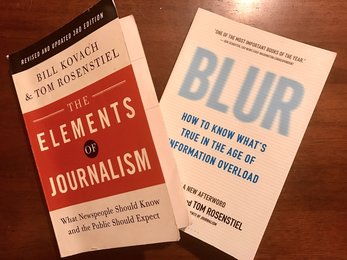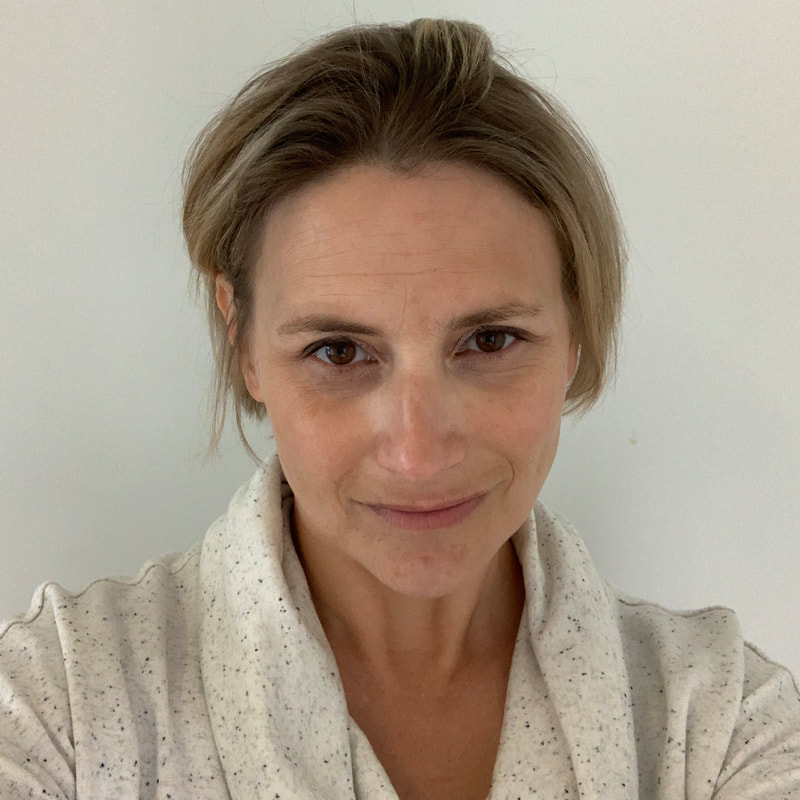 Two of the books written by veteran reporters, editors and journalistic leaders Bill Kovach and Tom Rosenstiel. I’ve been reading these books for my graduate course The Social Role of Mass Media this semester and thinking about the current rhetoric surrounding journalism in our country. Two of the books written by veteran reporters, editors and journalistic leaders Bill Kovach and Tom Rosenstiel. I’ve been reading these books for my graduate course The Social Role of Mass Media this semester and thinking about the current rhetoric surrounding journalism in our country. Over the past five years, I’ve made a dramatic shift in my teaching focus. Half of my teaching load is still English — writing and literature — and I love that part of my job. As I’ve taken over and my school’s publications program and embarked on a new Masters program in journalism, however, my focus on scholastic journalism has opened my eyes to the importance of teaching our students about their role as citizens — the importance of a free press and their duty to be informed and to inform others, ethically and responsibly. We’ve talked a lot in my high school journalism classes about the challenge of balancing the responsibilities of the four ethical pillars of the Society of Professional Journalists' Code of Ethics: to seek truth and report it, minimize harm, be accountable and transparent, and act independently. That first pillar of truthfulness is arguably the most important of the four, as most journalists place the search for truth above all else. But how can we talk about this pillar with our students when the current political rhetoric puts the very nature of truth in question? In the third edition of their seminal text The Elements of Journalism, Bill Kovach and Tom Rosenstiel pose a simple question: “What is journalism for?” Should it be a mirror that simply reflects society as it is, or should it be a candle illuminating dark corners to make the world a better place? Can it be both? “The primary purpose of journalism,” they write, “is to provide citizens with the information they need to be self-governing.” But in an era where the president of the United States makes so many false and misleading statements that the Washington Post has created a spot for weekly fact-checking and presidential adviser Kellyanne Conway refers to Press Secretary Sean Spicer’s incorrect data about inauguration crowds as “alternative facts” — in an era when the president states he has a "running war with the media” and says that “they are among the most dishonest human beings on Earth,” how can journalists fulfill this crucial role as trusted informants? If the default is to assume journalists are liars, can our student journalists still see purpose and take pride in their work? There are plenty of think-pieces already about the potential consequences of the era of Trump for the professional news media, but I’ve been thinking about the impact this will have on scholastic media programs across the country. If the social role of journalism is to inform the public as truthfully as possible, yet our president refers to some of our most venerable and respected news media institutions as “dishonest” or “fake news,” we journalism advisers need to find a way to have a meaningful discussion about the purpose of student news media in our communities. To do this, we must first have a conversation with our students about truthfulness. What does it mean to be truthful? Is truthfulness accurate numbers and statistics? Multiple points of view? Context to help the reader understand the time and place and other circumstances? All of the above? Kovach and Rosenstiel write that journalistic truth “means much more than mere accuracy. It is a sorting-out process that takes place between the initial story and the interaction among the public, newsmakers and journalists.” To tease out what this means, they quote Bill Keller, former executive editor of the New York Times: “We strive for coverage that aims as much as possible to present the reader with enough information to make up his or her own mind. That’s our fine ideal.” In other words, the facts — as best as they can be determined by reliable, reputable sources — are where a good journalist starts. “If the foundation is faulty,” Kovach and Rosenstiel write, “everything else is flawed. A debate between opponents arguing with false figures or purely on prejudice fails to inform. It only inflames. It takes the society nowhere.” It is not, however, where a good journalist ends. "It is more helpful, and more realistic," they continue, "to understand the truth we seek or can expect from journalism to be a process — or a continuing journey toward understanding — that begins with the first account of an event and builds over time." This kind of truthfulness is not easy. It means paying attention for a sustained period of time, making connections, re-evaluating previously held opinions, and constantly seeking new information. It means admitting when we make mistakes, as Time reporter Zeke Miller did when he incorrectly tweeted that the bust of Martin Luther King Jr. had been removed from the Oval Office. Although it is good Miller retracted and corrected this statement within an hour, it would have been better if he’d fact-checked the inflammatory claim in the first place. It also means not simply repeating what authority figures say, but holding their statements to the same level of scrutiny and making an informed decision about how to report inaccuracies and lies. It may be difficult to have these conversations in our classrooms knowing that our students come from diverse social and political perspectives. In 20 years of teaching, I have always striven for political neutrality. Regardless of my personal feelings about candidates or elected officials, I want to provide my students with an open forum where they feel safe expressing differing views on issues — to do as a teacher what Keller says is the job of an ethical news media: to present each student "with enough information to make up his or her own mind.” But an understanding of truthfulness is not partisan; it is foundational to a healthy democracy. The fact that the president and his spokespeople are Republicans is beside the point. There’s a reason FactCheck.org wrote about every 2016 presidential candidate during election season and organizations like National Public Radio brought out their entire political staff to do a live, annotated fact-check during each debate. What is unique about this new administration is its level of animosity towards the news media as a whole and the messaging that the press can’t be trusted, and that is the conversation we must have with our students. As Washington Post political commentator Chris Cillizza wrote after Meryl Streep’s Golden Globes’ speech: regardless what you think of journalism or the media in general, “you should root like hell for people who are paid to keep tabs on the promises our politicians make, on the people they surround themselves with and on the policies they choose to pursue. Without such a check and balance, the powerful become ever more powerful and the powerless have less and less recourse to do anything about it. That's a bipartisan reality." Journalists, professional or scholastic, are human. Sometimes, they might settle for a more superficial story than is ideal due to lack of time or effort. Frequently, they will have to confront their own biases and purposefully set them aside. Undoubtedly, they will make mistakes. But we need to reassure our student journalists that what they are doing is still important and still has value, perhaps now more than ever. If their goals are lofty and they keep reaching for truthfulness — even in a time when our highest officials say the media is incapable of truth — they are serving an important role in their communities: as mirrors, as candles, as reflections and illuminations of the world.
2 Comments
|
About“And though she be but little, she is fierce!” -A Midsummer Night’s Dream Archives
December 2020
Categories
All
|

 RSS Feed
RSS Feed